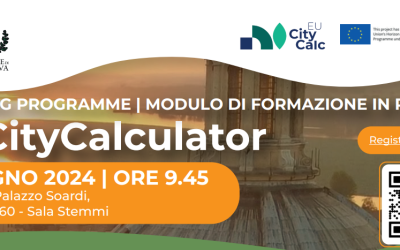Are national governments really involving local authorities in the revision of NECPs?
The European Union’s Governance Regulation requires EU countries to conduct long-term climate planning in National Energy and Climate Plans (NECPs). These are updated every 5 years, with the current update cycle taking place between June 2023 and June 2024.
As we covered in a previous set of videos, countries must ensure that key stakeholders – such as local authorities, citizens, and others – are given the opportunity to actively participate in drafting and updating NECPs (Article 10 of the Governance Regulation) and are also represented in structured “multi-level climate and energy dialogues” (Article 11).
Therefore, with the update of NECPs planned to wrap up in June of this year, where do we stand? EUCityCalc partners took stock of progress and shortcomings in an in-person project meeting held in Brussels this March.
Reality check: are national governments fulfilling their obligations to engage with local authorities and the public on their climate plans?
During each NECP update cycle, the European Commission assesses draft NECPs, submitted by countries 1 year before the final deadline, to recommend improvements to their plans before the final version can be submitted.
The Commission’s assessment acknowledged the key role of cities in climate policymaking – “local and regional authorities are important for the implementation of energy and climate policies” – but found numerous shortcomings in the implementation of the Governance Regulation’s Articles 10 (public participation) and 11 (multi-level climate and energy dialogue).
For example, the assessment noted that many EU countries “did not cover all the aforementioned obligations [for early and inclusive public participation]” and that “very few Member States demonstrate concrete evidence of how they involve them [local and regional authorities] in the process of preparing the draft updated NECP, and even fewer are building on an established multilevel dialogue for this process.”
Lessons from NECPlatform: setting up dialogues between national governments and cities
The EU-funded project NECPlatform, involving Energy Cities and other partners, aims to establish multi-level climate and energy dialogues in several European countries.
These dialogues facilitate communication between local decision-makers and national governments, promoting cooperation and addressing local needs. While the project has successfully organized multi-level dialogues, it faces challenges such as the temporary nature of the initiative and potential deprioritisation by future governments. In a context in which collaboration with national governments is essential, but some are not fulfilling their obligations under EU regulations to conduct such dialogues independently, projects such as NECPlatform prove to be crucial.
Experiences from the ground: how EUCityCalc partners in Portugal, Czechia, and Latvia have engaged with their governments
EUCityCalc partners from Portugal (ENA), Czechia (SEMMO), and Latvia (Riga Energy Agency) also shared their experiences about participating in multi-level climate and energy dialogues, underscoring their recommendations to their national governments.
Overall, EUCityCalc partners echoed similar experiences as those in the NECPlatform project, stressing that the dialogues were an important opportunity to directly communicate with national representatives about the role of cities in contributing to national targets and in receiving further support to scale up their actions. At the same time, the dialogues did not always have adequate representation of stakeholders, or in some cases were either too specific (sectoral focus) or too general.
Learn more on the Portuguese multi-level dialogue here.
Towards a revision of the EU Governance Regulation
Overall, there are many lessons to draw from the current update of the NECPs and the implementation of the Governance Regulation. Adequate provisions for public participation and frameworks for dialogues between national, regional and local authorities tend to still be quite flawed or entirely absent in some cases.
Given that these are requirements under the Governance Regulation, and that the same issues arose during the last NECP update cycle 5 years ago, this adds to the growing list of evidence that the Governance Regulation needs a fundamental revision.
In the coming months, EUCityCalc will share recommendations to enhance multi-level governance in climate policy-making, focusing both on the need to revise the Governance Regulation as well as sharing EUCityCalc partners’ recommendations to their national governments. Stay tuned!
Read our toolkit to learn more about how cities can unlock their climate action here.











